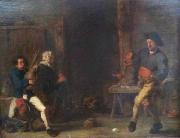Wholesale Oil Painting Reproductions No Minimum and Door to Door! |
|||||||||||
|
|
|||||||||||

|
|||||||||||
|
|
|
||||||||
All Pieter Aertsen Oil Paintings |
||||||||
|
|
||||||||
|
|
||||||||
|
Artist Introduction: 1508-1575
Flemish
Pieter Aertsen Galleries
Dutch painter and draughtsman, active also in the southern Netherlands. He probably trained in his native Amsterdam but early on moved to Antwerp, where he enrolled in the Guild of St Luke as a master in 1535. In 1542 he was granted citizenship of the city. Among his pupils in Antwerp were Johannes Stradanus and later Joachim Beuckelaer, a cousin of the artist wife and his most loyal follower. The earliest known work by Aertsen is a triptych with the Crucifixion (c. 1545-6; Antwerp, Maagdenhuismus.) for the van den Biest Almshouse in Antwerp. From 1550 Aertsen development can be traced through a large number of signed and dated paintings. Religious works, mostly intended for churches, must have formed an important part of Aertsen output. His early paintings seem to have been strongly influenced by other Antwerp artists, as can be seen in the van den Biest triptych, where the figures are close to those in Jan Sanders van Hemessen background scenes. Van Hemessen influence is also strong in the pair of triptychs showing the Seven Sorrows of the Virgin and the Seven Joys of the Virgin (the latter dated 1554; both Zoutleeuw, St Leonard).
|
||||||||
|
|
||||||||
|
The Egg Dance Painting ID:: 172 |
1557
Rijksmuseum, Amsterdam |
|||||||
Height Width |
INS/CM Quality |
|||||||
|
X |
| |||||||
|
|
||||||||
All Cornelis Saftleven Oil Paintings |
||||||||
|
|
||||||||
|
|
||||||||
|
Artist Introduction: (c. 1607, Gorinchem - 1 June 1681, Rotterdam) was a Dutch Golden Age painter
He was born into a family of artists, and learned to paint from his father Herman, along with his brothers Abraham and Herman Saftleven the Younger. He lived for a time in Utrecht with his brother.
Saftleven's subject matter covered various subjects, including genre works, portraits, beach scenes, and biblical and mythological themes. Some consider his images of Hell to be his most individual contribution to Dutch painting
|
||||||||
|
|
||||||||
|
|
The egg dance Painting ID:: 98235 |
1632(1632)
Medium oil on panel
Dimensions 39 x 50 cm
cyf |
||||||
Height Width |
INS/CM Quality |
|||||||
|
X |
| |||||||
|
|
||||||||
|
Prev Next
|
||||||||
|
|
||||||||
|
Related Paintings to Cornelis Saftleven :. |
||||||||
|
|
||||||||
|
CONTACT US |


